SMO JUNIOR SECTION 2012 SOLUTIONS PART 2
Subscribe to our ▶️ YouTube channel 🔴 for the latest videos, updates, and tips.
Problem 3 :
Using the vertices of a cube as vertices , how many triangular pyramid can you form?
(A) 54 (B) 58 (C) 60 (D) 64 (E) 70
Solution :
Problem 4 :
AB is a chord of a circle with center 0. CD is the diameter perpendicular to the chord AB, with AB closer to C than to D. Given that ∠.AOB = 90° , then the quotient
area of △ABC/area of △AOD = ?
(A) √2 - 1 (B) 2 - √2 (C) √2/2 (D) (1+√2)/2 (E) 1/2
Solution :
Let radius of the circle be 1.
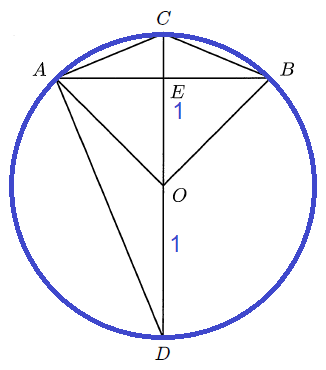
Area of triangle ABC = 2(Area of AEC)
= 2(1/2 x AC x AE) ==> CE x AE -----(1)
Area of triangle AOD = 1/2 x AE x OD -----(2)
(1) / (2)
= CE / (1/2) x 1
Area of triangle AOD = 2 CE
Here CE = OC - OE
Triangle AEO is 45-45-90 right triangle.
OA = radius = 1
OA2 = AE2 + EO2
12 = AE2 + AE2
2(AE)2 = 1
(AE)2 = 1/2
AE = 1/√2 = OE
OE = √2/2
CE = 1 - (√2/2)
Area of triangle AOD = 2[1 - (√2/2)]
= 2[(2 - √2)/2]
= 2 - √2
So, option B is correct.
Problem 5 :
The diagram below shows that ABCD is a parallelogram and both AE and BE are straight lines. Let F and G be the intersections of BE with CD and AC respectively. Given that BG = EF, find the quotient DE/ AE.
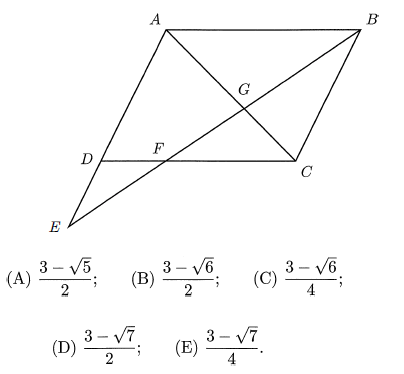
Problem 6 :
Four circles each of radius x and a square are arranged within a circle of radius 8 as shown in the following figure .
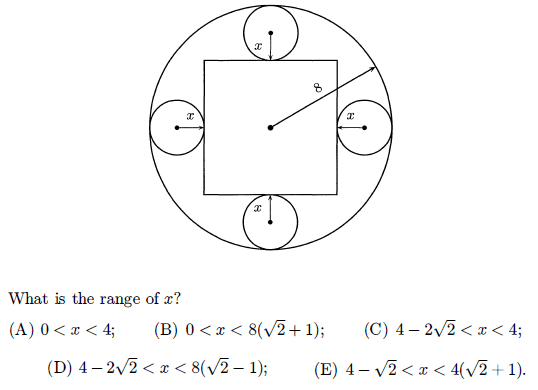
Solution :
To find the minimum value of x, enlarging square.
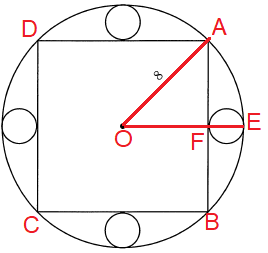
OA = OE = radii = 8
Triangle OAF is 45 - 45 - 90 degree special right triangle.
OA = hypotenuse
OA2 = OF2 + FA2
82 = OF2 + OF2
2OF2 = 64
OF2 = 32
OF = √32
OF = 2√2
FE = OE - OF
FE (Diameter) = 8 - 2√2
Radius = (8 - 2√2)/2
= 4 - √2
By enlarging circle, we get
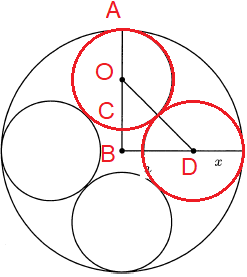
AB = 8, OA = x = OC, BC = unknown
AB = 8
AO + OC + CB = 8
x + x + CB = 8
CB = 8 - 2x, BD = 8 - 2x + x ==> 8 - x
Triangle OBD,
OD2 = OB2 + BD2
(2x)2 = (8 - x)2 + (8 - x)2
4x2 = 2(8 - x)2
2x2 = (8 - x)2
8-x = x√2
Now x√2 + x = 8
x(√2+1) = 8
So, option D is correct.
Subscribe to our ▶️ YouTube channel 🔴 for the latest videos, updates, and tips.
Recent Articles
-
Finding Range of Values Inequality Problems
May 21, 24 08:51 PM
Finding Range of Values Inequality Problems -
Solving Two Step Inequality Word Problems
May 21, 24 08:51 AM
Solving Two Step Inequality Word Problems -
Exponential Function Context and Data Modeling
May 20, 24 10:45 PM
Exponential Function Context and Data Modeling